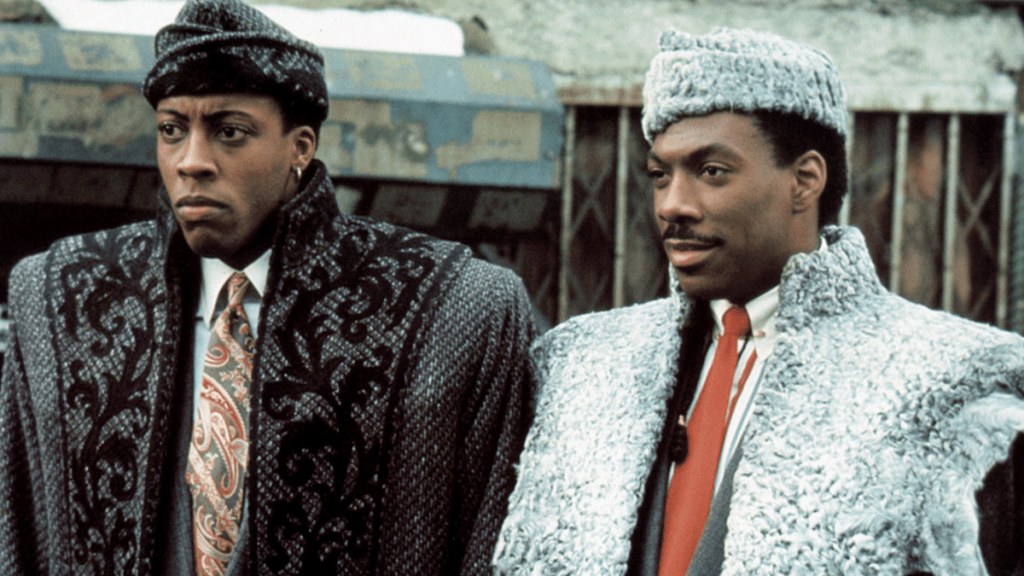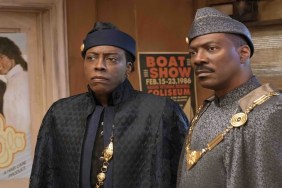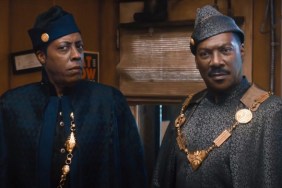It’s rare that royalty needs an introduction, but somehow, Coming to America still feels like it isn’t brought into the conversation enough when discussing the best comedies of all time. It’s hard to refer to a film like this as underrated, but 35 years after its release and this troubled project is still not always given the respect it deserves, even as more people (re)discover it. So much about this romantic comedy simply worked, with nearly everything gelling perfectly (on screen at least), but Coming to America’s most impressive quality — and what most likely keeps it so evergreen, even with a few problematic elements and dated references — is the amazing cast.
The story of the film is straightforward, a small twist of the classic tale. A rich man must find the woman of his dreams, or some even call it a reverse Aladdin, but without all the magic and Jafar — so maybe just that one aspect of that story. Prince Akeem Joffer is celebrating his 21st birthday, which is when he’s to meet his new bride for their arranged marriage. She’s been trained from birth to serve his every whim, to the point of barking like a dog at his command, but this isn’t what our protagonist wants. As a member of Zamunda’s royal family, the Prince has led a life of wealth and privilege, but he wants to see the world and find true love, a wife who loves him for who he is. Thus begins the journey to Queens in New York City, the only place that makes sense for the man who will eventually be King. Not everyone in the family supports this, however, and the girl of his dreams may already have a boyfriend, but if my own life has taught me anything, those are just obstacles to keep us away from good sex and happiness.
This story is credited to Eddie Murphy in the opening scene of the film, but there are some legal issues behind that. Coming to America also had some controversial elements when it comes to racism, depictions of African culture, and how it handles its look at classism, but these conversations mostly take a backseat to the funny and romantic story on display. The other problems were between the star and director John Landis, as well as some viewers critiquing the pacing of the movie, but it is rare to hear complaints about the cast.
Eddie Murphy plays Prince Akeem Joffer, our main character and the comedic name plastered all over this production. A lot of the buzz for Coming to America was around the cast, but especially Murphy, and some believe this may be one of – if not his best – films. This is potentially the feature that made him a household name for most people, as his career had gone from stand-up and SNL to releasing his hit single “Party All The Time,” and momentum was on his side. As an iconic comedian, there was no doubt that Murphy would be humorous in the role, but there are many scenes where he feels restrained and charming. It’s hard to see why any woman wouldn’t want him after just a few scenes. The Prince shows that he can learn (like with the bad language he encounters) and demonstrates some decisive leadership skills, even if they backfire slightly. Akeem is an excellent character, and it is hard to imagine many others filling those shoes. Starting a trend of playing multiple characters in his films, Murphy also performs as soul singer Randy Watson, a barber named Clarence, and a memorable Jewish customer named Saul.
Arsenio Hall plays Semmi, Akeem’s friend, ‘servant,’ and the person the royal family expected to keep the Prince out of trouble. Hall was another hot property at the time, as his fame was growing. He was allowed to play a fun character who was a troublemaker for Akeem and slightly goofier in several scenes. With his experience doing stand-up comedy and as the voice of Winston Zeddemore on The Real Ghostbusters cartoon, it makes sense that his reactions and facial expressions crack people up so much. Semmi takes a bit more of a backseat in the final act of the film, but his presence is still felt and he remains an excellent and humorous foil, though unintentional, for the Prince. Hall’s character was hard to forget and he would go on to dominate the late-night talk show scene for over half a decade. Like Murphy, he would also play additional characters, such as Morris the barber, Reverend Brown, and one of the potential suitors for Akeem, who is listed as “Extremely Ugly Girl” in the credits.
Both men did spectacularly with the additional characters, but we also have to give credit to Rick Baker’s superb make-up artistry for helping bring them alive.
James Earl Jones and Madge Sinclair play King Jaffe Joffer and Queen Aoleon Joffer of Zamunda, Akeem’s father and mother. Jones doesn’t need an introduction per se, but I think his role as Darth Vader makes some forget how charming and funny this actor can be. The episode of Big Bang Theory where he plays himself and hangs out with Sheldon is hilarious. The man is a legend, known for his voice alone, but his presence as the King is undeniable. The Queen is a powerful force also, as Sinclair delivers an excellent performance not only as a mother, but someone to challenge what the King believes about their son’s future. In fact, these two did so well playing a royal couple that they’d do it again as animated characters for The Lion King.
Shari Headley plays Lisa McDowell, Akeem’s new love interest. This was Headley’s breakout role and one she executed almost perfectly, as this character goes through a range of emotions throughout the story and her expressions are on point. The few moments that she gets to be playful and warm come across as genuinely heartfelt and it feels that these two truly will work out together.
John Amos plays Cleo McDowell, Lisa’s father and the owner of a restaurant that we shouldn’t confuse with McDonald’s. The scene where he’s explaining the difference between the two eateries has always stuck with me, as Amos is another actor who has done serious work (like in Die Hard 2, The West Wing), but has also proven himself as a comedic performer. His path here as Akeem’s boss, a supporter of his daughter’s original suitor, and greedy father to defending his child and what they’ve worked for gives him a good bit to work with in a short amount of time. We get to see him have a moment of personal growth and delivering some of the more subtle great jokes in the film.
Eriq La Salle plays Darryl Jenks, Lisa’s current boyfriend and the heir to the Soul Glo fortune. He’s a douche, a fact that’s established quite early on and the ending doesn’t go well for him, but at least he ends up with Patrice McDowell (Allison Dean), who seems more suited for him. This isn’t one of the stronger performances of the movie, but we aren’t meant to like Darryl. However, I’ve always appreciated that nothing he does ever seems particularly malicious, rather he takes advantage of situations, accepts credit for things he didn’t do and is simply self-serving and inconsiderate. All that aside, the ending makes him seem like a wet puppy who still needs love too.
Louie Anderson plays Maurice, an employee at McDowell’s with some ambition. There’s a small speech where Anderson tells Akeem and Semmi about his intended rise to Assistant Manager in just a couple of years. Maurice’s role as someone who is genuinely excited about their career in fast food and rising up through the ranks bounces off the opposing positions Akeem and Semmi have to their work well, adding a small but enjoyable layer to their interactions. There’s a little something in every line he delivers, which isn’t a surprise for this talented comedian. Eddie Murphy originally wanted the film to be an all-black cast, but the studio was forcing them to add at least one white comedian, thus Anderson’s involvement. Murphy and Hall were fans of Anderson’s work and the time they had spent with him, plus the generous comedian had covered Eddie’s tab once upon a time.
Outside of the main cast, the stars dealt with a few quirky characters that helped either bring in the laughs or establish that Akeem and Semmi were fish out of water. Frankie Faison plays their landlord, Vanessa Bell is Imani Izzi, Akeem’s arranged wife, and Vondie Curtis-Hall plays a vendor at the basketball game who is from Zamunda. Even in the brief moments we see them, each of these actors makes the most out of that time and adds something to the film. I love that everyone in the movie is charming and likable to some degree, or we at least we understand them. No one here feels completely flat.
There are a few neat guest spots as well. Don Ameche and Ralph Bellamy play their roles from the film Trading Places (1983), another comedy gem where they portrayed Mortimer and Randolph Duke. It’s a gag no one gets if they aren’t familiar with the other Murphy/Landis outing, but those like me who love the movie light up every time that scene happens. This is the film debut for Cuba Gooding Jr. who plays a boy getting a haircut and originally had a full scene, but that was cut out. Most know that Samuel L. Jackson also appears in the movie, as he attempts to rob McDowell’s, but not everyone is aware that Wesley Snipes almost played Darryl, which is partially why he’s in the 2021 sequel.
“Look at it this way. At least we learned how to make French fries.” Coming to America is a classic that holds up, a film that is genuinely funny upon repeat viewings that I still enjoy watching. Over the years I’ve learned more about it and remember the first time I cracked up noticing that the credits thanked the Zamunda Film Commission as one final joke. The movie is excellently quotable with lines like “The royal penis is clean, your highness,” and other gems finding their way into numerous rap songs. The legacy speaks for itself, and I don’t feel the need to champion Coming to America as much as remind those who may not have seen it in a while that it’s always a good time to journey back to Queens, whether it is love you seek or just the desire to see one of the best assembled comedic casts of all time doing their thing again.










